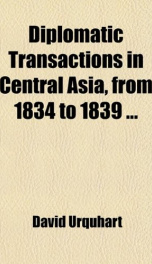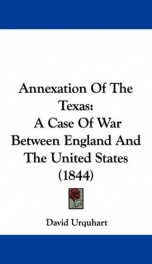diplomatic transactions in central asia from 1834 to 1839

Purchase of this book includes free trial access to www.million-books.com where you can read more than a million books for free. This is an OCR edition with typos. Excerpt from book: PART II. RELATIVE POSITION OF THE DIPLOMACY OF GREAT BRITAIN AND RUSSIA. If Russia in any one state is found to aim at acquisition, her designs are dangerous in all; if England in any one attempts to preserve, she must use those means which will enable her every where to protect the weak and to resist the strong. England and Russia could not be opposed at any one point without being opposed at every point, nor united in one if not in all. But it is the assault of Russia upon each and all of these states which has alone called forth the interest and the interference of England in the East, and the sole object of that interference is to oppose her. It is the assault of Russia, by endangering nations and violating rights, which has given that influence and power to Great Britain by which Russia may be restrained. Unless England is opposed to Russia, she is powerless to protect any ally, or to assert any right, because she herself is allied to violence and a sharer in injustice. Hitherto English Ministers have done that which she desired they should do ; but they have always thought that they were acting in opposition to her. But it is impossible that an English Minister could act with and against Russia in regard to the same country, or that he should co-operate with Russia in one country and oppose her in anotherby mistake. These contradictions are, however, in evidence. We have seen Lord Pal- merston asserting in 1834 union of Great Britain and Russia in regard to Persia. In the course of the following year (1835) we shall see him acting ostensibly against her at Teheran. In the same year, month, and week in which he united England with Russia in regard to Persia, was he, in another country, taking against her steps apparently the most hostile, and holding to other Courts...
Info about the book
Author:
Series:
Unknown
ISBN:
1412846196
Rating:
4.5/5 (3)Your rating:
0/5
Languge:
English
Users who have this book
Users who want this book
What readers are saying
What do you think? Write your own comment on this book!
write a commentGenre
if you like diplomatic transactions in central asia from 1834 to 1839 try:
Do you want to read a book that interests you? It’s EASY!
Create an account and send a request for reading to other users on the Webpage of the book!



